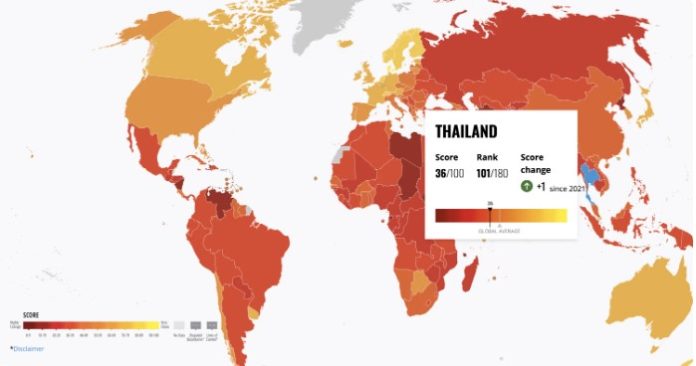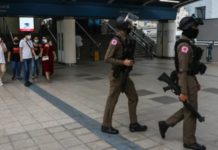
In 2022, Thailand was ranked 101th out of 180 countries and territories in the Corruption Perception Index (CPI) by Transparency International – a global movement that works to end corruption in more than 100 countries around the world.
The CPI measures how corrupt each country’s public sector is perceived to be and gives it a score using different data sources, including corruption surveys and assessments.
“A country’s score is the perceived level of public sector corruption on a scale of 0-100, where 0 means highly corrupt and 100 means very clean,” Transparency International explained on its website.
Thailand scored 36 last year, below the global average of 43. The country also lagged behind its Southeast Asian neighbours such as Singapore, Malaysia and Vietnam, which scored 83, 47 and 42 respectively on the CPI.
Following An’s case, Thailand’s national police chief emphasised how every police officer deployed at checkpoints must wear their uniform and carry a police body camera while on duty.
The camera must also record both images and sound throughout the period of inspection, and the files must then be stored in the computer system of their respective units for at least 20 days.
“We must be more transparent and employ body cameras in our work as soon as possible. Right now, we already have a certain amount of cameras but they may not be sufficient,” Pol Gen Damrongsak said in a press conference on Jan 31.
“We’ve therefore requested an extra budget to purchase more cameras for work purposes, which will increase transparency and prevent gaps in our work.”
For Rangsiman the lawmaker, however, the problem of corruption within the Thai police force is also linked to the issue of salaries.
Low-ranking officers usually struggle with low incomes and limited salary increments, he said, “and if they want to be promoted, they often have to find money to buy the position.”
“If we have to solve this problem, we must tackle the root causes, which include the well-being of the police – whose internal system is rife with corruption – and the promotion that can be traded.
“We also need to establish an external system to carry out investigations, instead of letting police investigate themselves,” Rangsiman added. – CNA



































